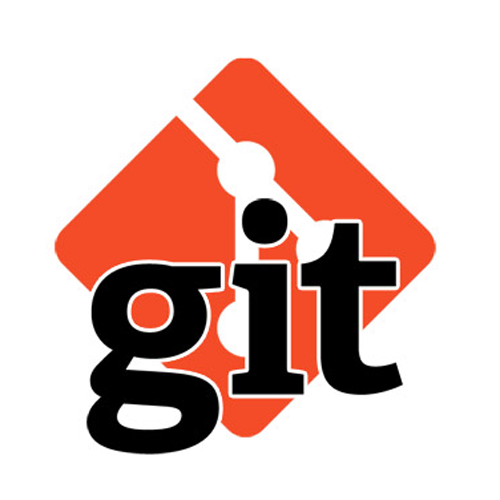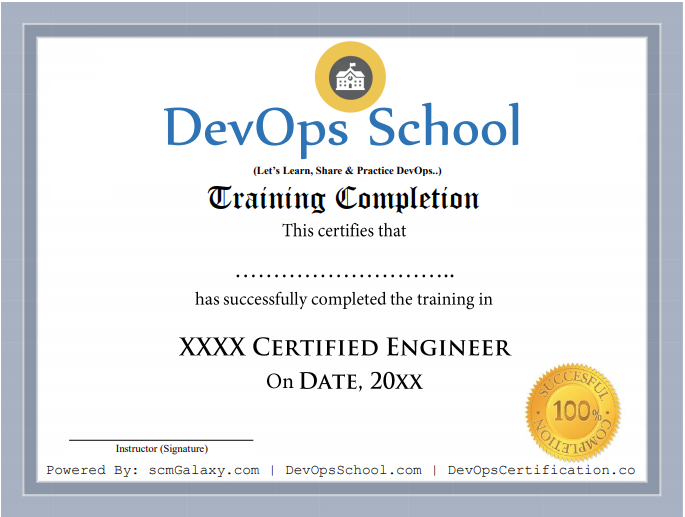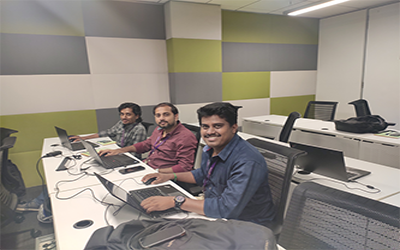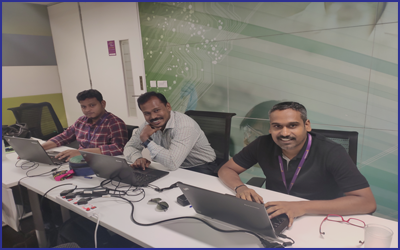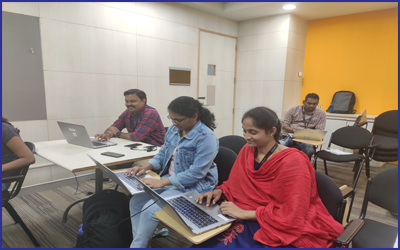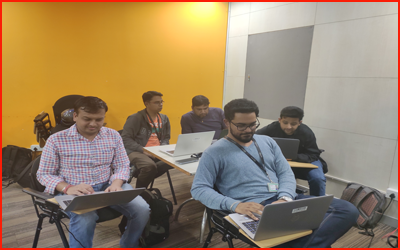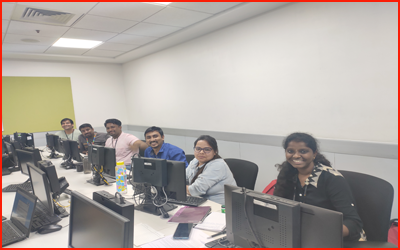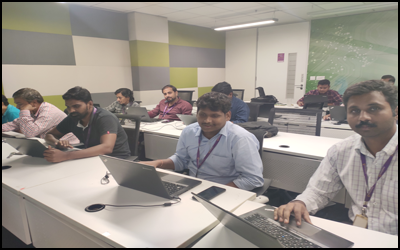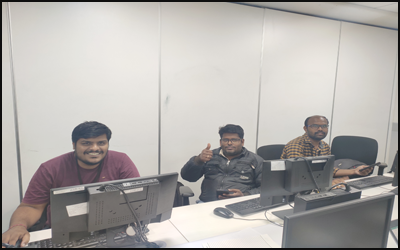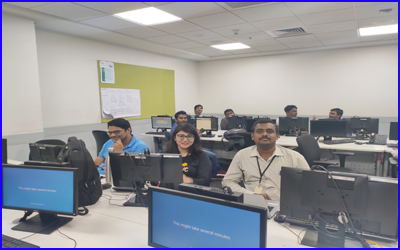8000+
Certified Learners
15+
Years Avg. faculty experience
40+
Happy Clients
4.5/5.0
Average class rating
About Git Monorepo Training
A Git monorepo is a repository that contains multiple projects or components within the same repository, rather than having each project or component in its own separate repository. This approach is commonly used in large software development organizations to manage multiple related projects or components more efficiently. In a monorepo setup, all projects or components share the same version control history, which can make it easier to track changes across related codebases and coordinate development efforts. Additionally, it can simplify tasks such as dependency management, code sharing, and code refactoring across projects. Tools like Lerna and Yarn Workspaces are often used in conjunction with Git monorepos to help manage dependencies and streamline development workflows. However, managing a monorepo effectively can require careful planning and discipline to maintain organization and prevent issues such as merge conflicts and bloated repositories.
Why Git Monorepo is important
Git monorepos offer several advantages that make them important for certain development scenarios:
- Simplified Dependency Management: In a monorepo, all projects or components share the same dependency management system. This can streamline the process of managing dependencies, ensuring compatibility between different parts of the codebase.
- Unified Versioning: With all projects in a single repository, it's easier to synchronize versioning across them. This simplifies release management and ensures that related projects maintain compatibility.
- Code Sharing and Reusability: Components or libraries within a monorepo can be easily shared and reused across projects. Developers can leverage existing code without having to manage separate repositories or versions.
- Easier Refactoring and Code Maintenance: Refactoring code or making changes that affect multiple projects is simpler in a monorepo, as all related code is in one place. This can speed up development and reduce the risk of introducing inconsistencies.
- Improved Collaboration: Having all code in one repository encourages collaboration and knowledge sharing among team members. It's easier to see what others are working on, share code reviews, and coordinate efforts.
- Streamlined CI/CD Pipelines: Continuous integration and deployment pipelines can be more streamlined in a monorepo, as changes across multiple projects can be tested and deployed together.
- Simplified Onboarding: New team members can quickly get up to speed by exploring the monorepo, rather than having to navigate multiple repositories to understand the project landscape.
Git Monorepo Course Feature
A comprehensive Git Monorepo course should cover various aspects to provide learners with a solid understanding and practical skills. Here are some key features such a course might include:
- Introduction to Monorepos: Provide an overview of what monorepos are, their benefits, and when they are suitable for use.
- Setting Up a Monorepo: Step-by-step guidance on creating a monorepo using Git, including considerations for repository structure and organization.
- Managing Dependencies: Techniques for managing dependencies within a monorepo, including approaches like using package managers (e.g., Yarn, npm), symbolic links, or Git submodules.
- Versioning and Release Management: Strategies for versioning and releasing code within a monorepo, ensuring consistency and compatibility across projects.
- Code Sharing and Reusability: Best practices for sharing code and libraries between projects within a monorepo, including folder structure, module exports, and maintaining separation of concerns.
- Collaborative Development: Tips for collaborating effectively within a monorepo, including managing concurrent changes, code reviews, and pull request workflows.
- Performance Optimization: Techniques for optimizing performance in a monorepo environment, such as minimizing build times, reducing repository size, and caching dependencies.
- CI/CD Integration: Guidance on integrating continuous integration and deployment pipelines with a monorepo, ensuring smooth automated testing and deployment workflows.
- Scaling and Maintenance: Strategies for scaling a monorepo as the project grows, including managing large codebases, optimizing Git workflows, and mitigating potential challenges.
- Case Studies and Best Practices: Real-world examples and case studies of organizations successfully using monorepos, along with best practices and lessons learned.
Training objectives of Git Monorepo
The training objectives of a Git monorepo typically focus on enabling developers to effectively manage and collaborate on large-scale projects with multiple interdependent components. Here are some common training objectives:
- Understanding Monorepos: Educate developers about what a monorepo is, its advantages, and when it's appropriate to use one. Highlight the differences between monorepos and traditional multi-repository setups.
- Git Fundamentals: Ensure developers have a strong understanding of Git fundamentals, including branching, merging, rebasing, and resolving conflicts. Emphasize best practices for working with Git in a collaborative environment.
- Monorepo Architecture: Teach developers how to structure a monorepo effectively, including organizing code, managing dependencies between modules, and handling versioning.
- Workspace Setup: Guide developers through setting up their development environment to work with a monorepo, including configuring Git, IDEs, and other development tools.
- Dependency Management: Train developers on managing dependencies within a monorepo, including techniques such as symbolic linking, package managers (like Yarn or npm), and managing third-party dependencies.
- Code Sharing and Reusability: Demonstrate techniques for sharing code between projects within the monorepo, including creating shared libraries, modules, and components. Emphasize the importance of code reuse and maintaining a clean, modular codebase.
- Testing and Continuous Integration: Teach developers how to implement testing strategies within a monorepo, including unit tests, integration tests, and end-to-end tests. Introduce concepts of continuous integration (CI) and continuous deployment (CD) pipelines tailored to monorepo environments.
- Collaboration and Code Review: Educate developers on effective collaboration practices within a monorepo, including code review workflows, branch management strategies, and maintaining a clean commit history.
- Performance Optimization: Provide guidance on optimizing the performance of monorepo workflows, including strategies for handling large repositories, minimizing build times, and optimizing dependency management.
- Troubleshooting and Maintenance: Equip developers with troubleshooting skills for common issues that arise in monorepo environments, such as dependency conflicts, build failures, and performance bottlenecks. Teach best practices for maintaining a healthy monorepo over time.
Git Monorepo Target audience
The target audience for Git monorepo training typically includes:
- Software Developers: Both junior and senior developers who will be working on projects within the monorepo. They need to understand the structure, workflow, and best practices associated with monorepos.
- Software Engineers: Engineers responsible for designing and architecting software systems. They need to understand how to design a monorepo architecture effectively, including structuring code, managing dependencies, and optimizing performance.
- DevOps Engineers: Professionals responsible for setting up and maintaining the development environment, CI/CD pipelines, and infrastructure related to the monorepo. They need to understand how to configure tools and workflows to support monorepo development.
- Technical Leads and Architects: Individuals responsible for making high-level decisions about software development processes and architectures. They need to understand the implications of adopting a monorepo approach and how it aligns with broader organizational goals.
- Project Managers: Managers responsible for overseeing projects that use monorepos. They need to understand the benefits and challenges of monorepo development, as well as how to support their teams in adopting and leveraging monorepo practices.
- Quality Assurance (QA) Engineers: Professionals responsible for testing software applications. They need to understand how to set up testing environments and workflows within a monorepo, as well as how changes to one part of the codebase can impact other areas.
- Technical Writers: Writers responsible for documenting software projects. They need to understand the structure of the monorepo and how to document code, dependencies, and workflows effectively.
- System Administrators: Individuals responsible for managing the infrastructure and resources used by developers working within the monorepo. They need to understand the resource requirements and optimization strategies associated with monorepo development.
Git Monorepo Training methodology
When designing a training methodology for Git monorepo, it's essential to consider the diverse learning styles and preferences of the target audience. Here's a comprehensive approach:
- Interactive Workshops: Conduct interactive workshops where participants can engage with the material hands-on. Provide exercises and real-world scenarios to reinforce concepts such as branching strategies, dependency management, and code sharing.
- Online Courses and Tutorials: Develop comprehensive online courses or tutorials covering Git fundamentals and monorepo-specific topics. These can include video lectures, interactive quizzes, and step-by-step guides to cater to different learning preferences.
- Case Studies and Best Practices: Showcase real-world case studies of organizations successfully using Git monorepos. Highlight best practices, challenges faced, and lessons learned to provide practical insights for participants.
- Collaborative Learning: Encourage collaborative learning through group discussions, pair programming exercises, and peer code reviews. This fosters knowledge sharing and allows participants to learn from each other's experiences.
- Hands-on Projects: Assign hands-on projects where participants work on actual monorepo setups and workflows. Provide guidance and support as they navigate through challenges and apply the concepts learned in the training.
- Mentorship and Coaching: Offer mentorship and coaching sessions where participants can receive personalized guidance and feedback from experienced mentors. This helps address individual learning needs and challenges.
- Continuous Learning Resources: Provide access to a repository of resources, including documentation, tutorials, blogs, and forums, to support ongoing learning and skill development beyond the initial training program.
- Assessment and Certification: Assess participants' understanding and proficiency through quizzes, assignments, and practical assessments. Offer certifications or badges upon successful completion of the training program to recognize and validate their skills.
- Feedback and Iteration: Gather feedback from participants throughout the training program and use it to continuously improve and iterate on the curriculum and delivery methods.
- On-the-Job Application: Encourage participants to apply their learning directly to their day-to-day work within the monorepo. Provide opportunities for them to share their experiences and challenges with the group, facilitating further learning and collaboration.
Instructor-led, Live & Interactive Sessions
Duration |
Mode |
Level |
Batches |
Course Price at |
|---|---|---|---|---|
8 to 12 Hrs. (Approx) |
Online (Instructor-led) |
Advance |
Public batch |
24,999/- |
8 to 12 Hrs. (Approx) |
Videos (Self Learning) |
Advance |
Public batch |
4,999/- |
2 Days |
Corporate (Online/Classroom) |
Git Monorepo Training |
Corporate Batch |
Contact US |
Agenda: Git Monorepo Training Download Curriculum
| SL | Method of Training and Assesement | % of Weightage |
|---|---|---|
| 1 | Understanding the problems | 5% |
| 2 | Concept Discussion | 10% |
| 3 | Demo | 25% |
| 4 | Lab & Exercise | 50% |
| 5 | Assessments & Projects | 10% |
OUR COURSE IN COMPARISON
| FEATURES | DEVOPSSCHOOL | OTHERS |
|---|---|---|
| Lifetime Technical Support | ||
| Lifetime LMS access | ||
| Interview-Kit | ||
| Training Notes | ||
| Step by Step Web Based Tutorials | ||
| Training Slides |
- The career opportunities for skilled professionals are increasing significantly with huge scope for career growth.
- According to Indeed.com, the average salary of a Git professional is $177,530 per annum.
- Git being the leading data analytics tool is adopted by many MNCs worldwide. With this, the demand for Git professionals is gradually increasing - IDC.com
- IT Operations, IT Monitoring, IT Support, & Data Center teams.
- Business Analysts and Data Analysts who want to gain knowledge of Git development for creating Apps and Dashboards
- Understand Git concepts
- Apply various techniques to visualize data using multiple graphs and dashboards
- Implement Git in the organization to monitor operational intelligence
- Troubleshoot various application log issues using SPL (Search Processing Language)
- Implement indexers, forwarders, deployment servers and deployers in Git
- Have basic mathematic knowledge
- Want to learn more about Git
- Professionals seeking a transition to Cybersecurity domain from any background
- Cybersecurity professionals looking to enhance their skillsets
- Enthusiasts looking to enter the exciting world of Cybersecurity
